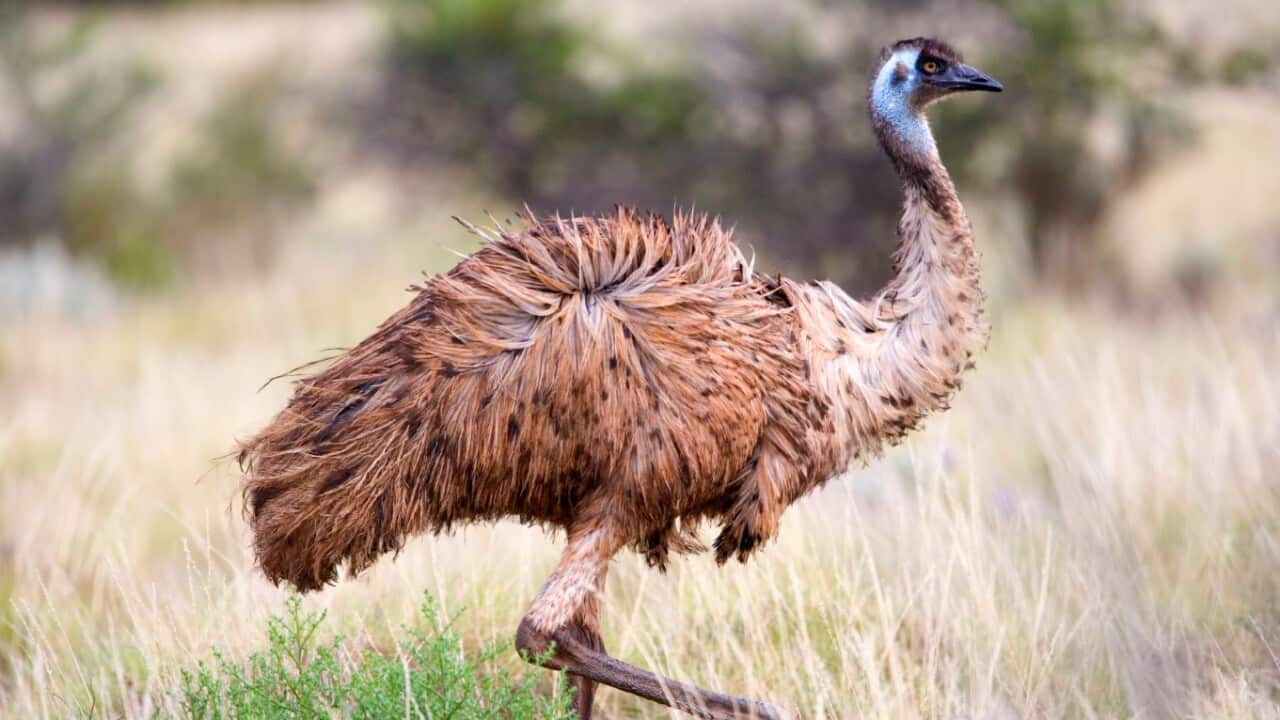--- Palisa Anderson explores all things emu egg in the brand-new series, , 7.00pm Sundays on SBS Food and On Demand. ---
Emus, arguably Australia’s most iconic Indigenous birds, are famous for many things: ; representing our country alongside the kangaroo; and being (that's why it appears on the national emblem as a symbol of the country moving forward).
Emus have even made a splash in various culinary scenes, with , low in , and and .
But lately, it’s their eggs that are causing a bit of a flap among high-end chefs, both at home and abroad.
In 2017, brought wide attention to the native Australian ingredient by serving a sweet , while Queensland-based chef recently used dried yolk to flavour meat and baked with emu egg whites. New York chef David Santos started scrambling the birds’ eggs with wild mushrooms at Louro in the West Village . And reality TV shows like have sought out the ingredient , demand for this “uniquely Australian product” is at an all-time high.
And yet, for Indigenous Australians, cooking with emu eggs is nothing new.
, a Quandamooka traditional owner living on , explains the centuries-long cultural and totemic significance of the emu to Australia’s First Nations’ peoples.
“Emus are part of the , where most tribes split into two halves; they marry into one another and police one another,” Walker says. “One half comes under the emu, the other comes under the kangaroo. Every year, the emu from May and June – the emu’s beak runs diagonally to the left from the bottom pointer of the Southern Cross. When you see that in the sky, that’s the time you gather their eggs. In nature, the male emus incubate the chicks – that’s why they’re seen as leading the way.”
Walker is a cultural and tourism officer for tourism package company and is responsible for developing new products that open up Quandamooka culture to the mainstream. Here, the main goals are breaking down barriers, but there’s also an emphasis on sampling native Australian ingredients as they’re meant to be eaten – that includes big, blue-hued, Jurassic-esque emu eggs.
“The tribal way of cooking emu eggs is in an earth oven, in ashes,” Walker explains. “It’s the same way we cook mud crabs here on Stradbroke Island.”
Emus have even made a splash in various culinary scenes, with meat that’s lean, low in cholesterol, and high in iron and vitamin C.
is interested in marrying his traditional European training with his inherited instincts, which pull him to the native ingredients and the cooking techniques spawned from the earth. Both Anderson and Walker speak Jandai language, in which the word for , and the word for emu egg is gubawi.
“Emu eggs, being as rich as they are, go really well in desserts and finer dishes,” Anderson says. “I made an emu egg crème brûlée for VIPs coming to the island once, finished off with lilly pilly and macadamia praline. One of the favourite dishes that everyone seems to love is a native wattleseed and milk chocolate mousse made with emu eggs.”
Anderson has a bit of a thing for sauces – it’s that classically trained background of his – so he often uses a basic French recipe for custard or mayonnaise and infuses emu eggs for a sweeter, richer tasting dessert.
Emus are the in the world (after ostriches), so it’s logical that their eggs are a sizeable , on average. According to Anderson, one emu egg is roughly equivalent to , and can feed up to six people quite comfortably. “The yolk is very rich in fat, amino acid and protein,” he says.
So it's a desirable product for anyone looking to feed a crowd or loaded with protein. But as with all native ingredients, provenance is important – and trends don’t always account for the delicate ecosystem of which animals like emus take part.
“There are more emu egg farms now,” Anderson says. “Emu eggs that are farmed don’t have quite the same flavour as wild eggs. We’re lucky enough when we go further out west, we can still get our hands on wild eggs.”
Farms, of course, are linked to the erasure of natural habitat for emus. “Cleveland [in Queensland] used to be known as emu point,” Walker says. “Emu and kangaroo were the main food source for the people up there. Now, it’s suburbia.”
Emu eggs, being as rich as they are, go really well in desserts and finer dishes. I made an emu egg crème brûlée for VIPs coming to the island once, finished off with lilly pilly and macadamia praline.
As Anderson explains, it pays to properly understand where the emu eggs are coming from. “I do use farmed eggs in my cuisine, but I only deal with sustainable farms. The emus aren’t penned, they’re what some would call free-range but we say ‘free spirited’, because the farmers are respecting the animals and the land. I’m very much about food mileage and respect for the country, all that comes from my heritage.
For Anderson and Walker, the future of the ingredient is inextricably linked to sustainability, but most chefs are taking steps in the right direction.
“It’s more about educating these chefs, and making sure they’re aware of the cultural importance, because it’s such a unique product – even to our people it is,” he says. “They’re plenty of well-trained chefs using it in their restaurants and they’re paying respect to the egg and using it without capitalising on it as such. We can’t always keep an eye on every chef using emu eggs, but I know there’re a lot of deadly chefs out there keeping all those things in mind.”
More native flavours

Gin-cured ocean trout with bush tomato emulsion and pickled cucumbers














